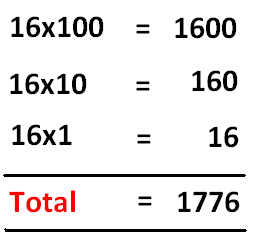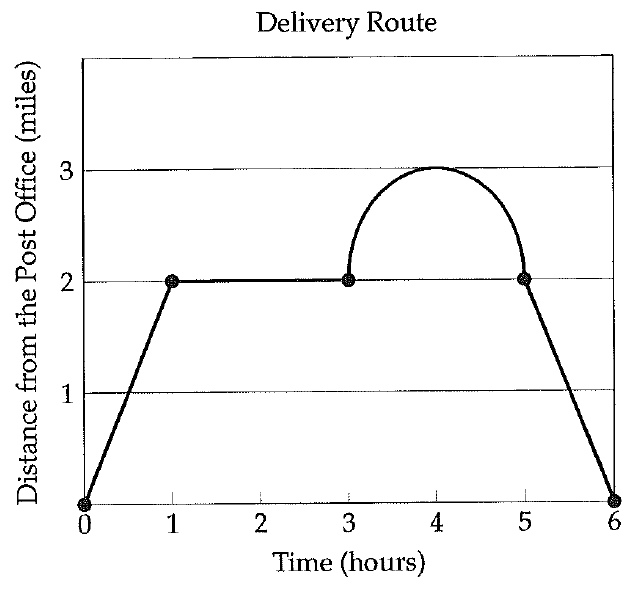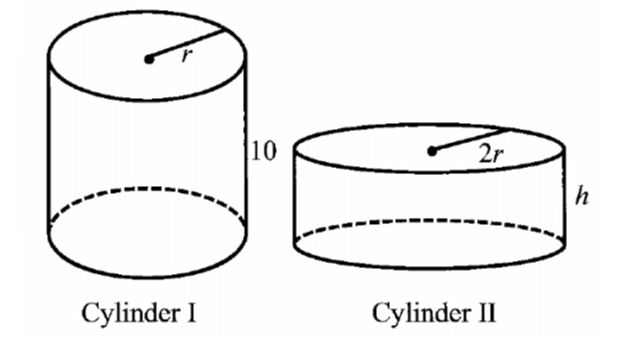SUM OF ALL THREE DIGIT NUMBERS FORMED USING 1 3 4 (without repetition)
List of Numbers Formed Using the Digits 1, 3, 4
Since we are going to form three digit numbers, let us have three blanks.
____ ____ ____
The first blank (hundred's place) has three options from the given three digits.
They are 1, 3, 4
If one of the three digits (1, 3, 4) is filled in the first blank, two digits will be remaining.
So, the second place has two options and it can be filled by one of the two digits.
After having filled the second blank, only one digit will be remaining.
So, the third place has one option and it can be filled by the remaining one digit.
The above explained stuff can be written as
3 x 2 x 1 = 6
Therefore the number of three digit numbers formed from 1, 3, 4 is 6.
They are
134
143
314
341
413
431
Because there are six numbers formed using the digits 1, 3 and 4, we are able to list out all the six number as shown above.
In case, we form 4 digit numbers with four different digits, we will get 24 numbers.
Is it possible to write all the 24 numbers and find sum of them in exam as done above ?
Everyone's answer will be "no".
Then, is there any shortcut ?
Yes. To know the shortcut, come to know the value of "K" using the formula given below.

Here, students may have question.
That is, what do we do with "K" to find the sum of all the three digit numbers formed from 1, 3 and 4 ?
Answer is given below.
Concept - Value of "K"
What does "K" do if one of the digits is "zero" ?
Answer :
1. Each one of the non-zero digits will come "K" times at the first place (hundred's place, if it is three digit number).
2. The digit "0" will come "K" times at the second place. The remaining blanks at the second place will be shared equally by the non-zero digits.
3. The same process which is explained above for the second
place will be applied for the third place.
What does "K" do if none of the digits is "zero"?
Answer :
Each one of the non-zero digits will come "K" times at the first
place, second place and third place.
How is the above concept applied in our problem ?
In our problem, we have
K = 6/3
K = 2
In the given three digits, none of the digits is "0".
So, each one of the given three digits (1, 3, 4) will come at the hundred's place,ten's place and unit's place 2 ( = K ) times in the 6 numbers formed using 1, 3, 4 (Please see the 6 numbers above).
Sum of Numbers at the First, Second and Third Places
To get answer for the question "What is the sum of all the three digit numbers formed from 1 3 4 ?", we have to find the sum of all numbers at first, second and third places.
Let us find the sum of numbers at the first place (hundred's place).
In the 6 numbers formed, we have each one of the digits (1, 3, 4) two times at the first place, second place and third place.
Sum of the numbers at the first place (100's place)
= 2(1 + 3 + 4)
= 2 x 8
= 16
Sum of the numbers at the second place (10's place)
= 2(1 + 3 + 4)
= 2 x 8
= 16
Sum of the numbers at the third place (1's place)
= 2(1 + 3 + 4)
= 2 x 8
= 16
Sum of All Three Digit Numbers Formed Using 1, 3, 4

Explanation for the Above Calculation :
16 is the sum of numbers at hundred's place. So 16 is multiplied 100.
16 is the sum of numbers at ten's place. So 16 is multiplied 10.
16 is the sum of numbers at unit's place. So 16 is multiplied 1.
Note :
The method explained above is not only applicable to get answer for the questions like "What is the sum of all the three digit numbers formed from 1 3 4 ?" This same method can be applied to find sum of all 3 digit numbers formed using any three digits in which none of the digits is zero.
Kindly mail your feedback to v4formath@gmail.com
We always appreciate your feedback.
©All rights reserved. onlinemath4all.com
Recent Articles
-
SAT Math Resources (Videos, Concepts, Worksheets and More)
Jan 29, 25 06:00 AM
SAT Math Resources (Videos, Concepts, Worksheets and More) -
Digital SAT Math Problems and Solutions (Part - 105)
Jan 29, 25 05:52 AM
Digital SAT Math Problems and Solutions (Part - 105) -
Digital SAT Math Problems and Solutions (Part - 104)
Jan 27, 25 11:29 AM
Digital SAT Math Problems and Solutions (Part - 104)

